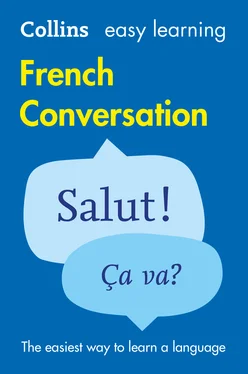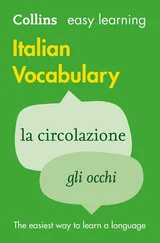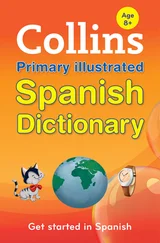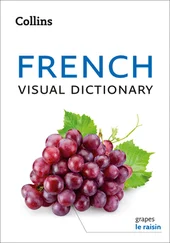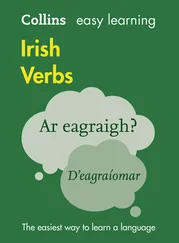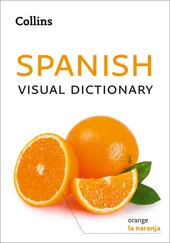Here are some key phrases you are likely to be hear when you’re travelling around.
| Prochain arrêt:… |
Next stop:… |
| Le train pour Nice part du quai numéro trois. |
The train for Nice leaves from platform three. |
| Votre billet, s’il vous plaît. |
Ticket, please. |
| Je peux m’asseoir ici? |
Do you mind if I sit here? |
| Continuez tout droit jusqu’aux feux. |
Go straight on till you get to the traffic lights. |
| Prenez la deuxième à gauche. |
Take the second turning on the left. |
| C’est en face de la cathédrale. |
It’s opposite the cathedral. |
| C’est tout près. |
It’s very near. |
| On peut y aller à pied. |
It’s within walking distance. |
| C’est à trois arrêts d’ici. |
It’s three stops from here. |
Lifestyle Tips
• If you’re behind the wheel of a car, be ready to produce your driving licence if asked for it by the police. If you’ve left it behind, you may well be fined. The police officer might ask you: votre permis de conduire, s’il vous plaît( your driving licence, please ). French drivers also have to be able to produce their carte grise( car registration document ) and their attestation d’assurance( car insurance certificate ).
• Motorways are not free in France. When you go onto the motorway, you get a ticket de péageor ticket d’entrée.When you come off the motorway this will show how many kilometres you’ve driven and how much you have to pay.
• At motorway tolls, some toll booths are manned, some are automatic (using bank cards), and some are reserved for drivers using the télépéagesystem which makes it possible to pay the toll via a sensor inside the car (with monthly bills sent to your address). It is best to stay clear of these lanes which are marked with a yellow “T” sign, as the drivers equipped with such sensors don’t take kindly to tourists holding up their fast lane!
• Over the past years, covoiturage( car sharing ) has become quite popular in France. It can be a cheap and convenient way of getting around, especially for short distances. There are many places where you can find offers for covoiturage,but local papers, and ad boards in shops are probably your best bet.
• If you’re asked to produce your titre de transporton the bus, the train or the underground, it means that you have to show your ticket to the inspector.
• Make sure you punch your ticket before you get on the train or bus. If you have forgotten to do so, it is advisable to go and see le contrôleur( the ticket inspector ) as soon as possible or you might be fined.
• If you’re in a hurry, you can hop on the train and buy a ticket for a small amount extra directly from a ticket inspector - go and see him or her as soon as you’re on the train or you might be suspected of resquillage( fare-dodging ).
• Queues tend to be informal in French-speaking countries. So if you’re trying to get to an information desk and don’t know if it’s your turn, just ask C’est à moi?or C’est mon tour?( Am I next? ). If you want to let someone in before you, you can say après vous( after you ).
Home from home
Dors bien! – Sleep well!
If you’re going to stay in a French-speaking country, the phrases in this unit will provide you with the language you need to help you find the sort of accommodation you want (hotel, hostel, self-catering accommodation or a flat to rent) and ensure that everything is to your satisfaction when you’re there. We’ll also give you a few tips on what the receptionist or your landlord or landlady may say to you.
To say what kind of accommodation you want in French, use je voudraisor je souhaite( I’d like ). voudraiscomes from the verb vouloirand souhaitecomes from the verb souhaiter.For further information on vouloirand -erverbs like souhaiter,see hereand here.
| Je voudraisune chambre avec un balcon. |
I’d likea room with a balcony. |
| Je voudraisréserver une chambre double pour deux nuits. |
I’d like tobook a double room for two nights. |
| On voudraitun dortoir de six personnes. |
We’d likea six-bed dorm. |
| Je souhaiterester trois nuits. |
I’d like tostay three nights. |
| Je souhaitelouer votre gîte pendant deux semaines. |
I’d like tobook your gîte for two weeks. |
je veuxis a slightly more direct way of saying what you want.
| Je veuxun appartement bien éclairé. |
I wanta well-lit flat. |
| Je veuxchanger de chambre; celle que vous m’avez donnée est humide. |
I want tochange rooms; the one you gave me is damp. |
| Je veux qu’on me rembourse. |
I wanta refund. |
| On ne veut pasde chambre côté rue. |
We don’t wanta room overlooking the road. |
Use je tiens àto say that you insist on something. tienscomes from the verb tenir.
| Je tiensvraiment àavoir vue sur la mer. |
Iabsolutely insist onhaving a view of the sea. |
| Je tiens àne pas être dérangé. |
I insist onnot being disturbed. |
| On tient àêtre dans le centre-ville. |
We insist onstaying in the centre of town. |
When you want to find out if something is available, use Est-ce que vous avez…?( Do you have…? ) or Est-ce que vous auriez…?( Would you have…? ). These come from the verb avoir.For more information on avoir,see here.
| Est-ce que vous avezdes informations sur le logement? |
Do you haveany information about accommodation? |
| Est-ce que vous avezdes chambres de libre? |
Have you gotany rooms free? |
| Vous avezInternet? |
Have you gotinternet access? |
| Est-ce que vous auriezdes serviettes, s’il vous plaît? |
Would you haveany towels, please? |
| Est-ce que je peux avoirla clé de ma chambre, s’il vous plaît? |
Can I havethe key to my room, please? |
| Est-ce que je peux avoirun reçu, s’il vous plaît? |
Can I havea receipt, please? |
| Est-ce qu’on peut avoirune liste des logements disponibles? |
Can we havea list of available accommodation? |
| Est-ce que je pourrais avoirdeux serviettes en plus? |
Could I havetwo more towels? |
If you are asking someone whether they can do something for you, use Est-ce que pouvez…?( Can you…? ) and Est-ce que vous pourriez…?( Could you…? ). They both come from the verb pouvoir.For more information on pouvoir,see here.
Читать дальше
